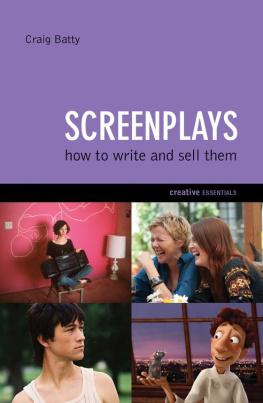The Art of Screenplays is a working handbook for writers with stories to tell. Addressing the key issues of creativity and craft, its aim is to connect with our natural understanding of story, to demystify the screenwriters art, and to enable fresh, original and authentic writing. Working on the central premise that drama reflects nature, and screenplays simply echo life as we know it, the areas Mukherjee discusses include:
The writers eye. How to gather, ferment and communicate story.
The art of action. Understanding structure through observation.
Who am I? Exploring the levels of characters.
Vertical structure. Say what you mean. Mean what you say.
Speak the speech. The art of not writing dialogue.

Robin Mukherjee has written extensively for theatre, television, radio and film. His television work includes many well-known series, for which he has been a core writer, including Eastenders, The Bill, Casualty, The Roman Mysteries and Medics, along with critically acclaimed serials and features. His first feature film won the Audience Award at the London Film Festival. His most recent feature, Lore, has won numerous awards worldwide and was nominated for an Australian Academy Award for Best Adapted Screenplay. His television serial Combat Kids, was recently nominated for a BAFTA for Best Childrens Drama.

For Tony Dinner mentor, friend and
lasting inspiration to so many writers.
And to all my students over the years,
from whom I have learned so much.
While the main laws of strategy can be stated clearly enough for the benefit of all and sundry, you must be guided by the actions of the enemy in attempting to secure a favourable position in actual warfare.
Sun Tzu, The Art of War
CONTENTS
INTRODUCTION
Overheard in a caf:
GIRL 1
(Munching on a cake)
So I was like, You know, Im just saying, you do that yeah? and its gonna come down, like, really on hard you. And she was like, Wha? Whats it to do wiv you? And I says, But its Neil, you know, hes like my bro in he?, and she was, Huh? You and Neil? I says, No, I said hes like my bro, yeah? And then she goes
(Sits back, folding her arms)
Oh, I see.
GIRL 2
You and Neil?
GIRL 1
Well yeah.
(Giggles)
Just the once.
Girl 1 might not have known it, but, in her construction of narrative and portrayal of character to evoke a moment and convey a point, she was writing a script. If you had asked her (which I wouldnt have dared), she would probably have acknowledged that she was telling a story. And, much as the grammatical purist might question her use of language, I couldnt help feeling a sneaking envy for the skills with which she commanded the attention of her audience. Its possible that she was a recent graduate of some intensive course in scriptwriting, or that the bookshelves of her bedroom sagged with voluminous tomes on the subject. But I doubt it. Im sure she watches TV and possibly the odd movie, but the question is: without a formal grounding in the art of dramatic composition, how was she able to tell a story? Moreover, why would she want to? And why was her friend so captivated apart from a personal involvement with some of the circumstances and our perennial fascination with scandal?
Girl 1 knew what she wanted to say (in between mouthfuls of pastry). She understood the central characters, and she was possessed by the emotional content of her tale. She needed only to let these dynamics operate to provide the entertainment her friend so enjoyed. Of course, there is a leap from the act of conveying an anecdote to the finessing of a professional screenplay, but the elements remain the same. Beyond formatting issues, structural niceties, editing of dialogue, and authentic character construction, our natural understanding of storytelling is enough to get us a long way, from title sequence to end credits.
Like anything, a story unfolds according to a mix of creativity and knowledge; which is to say, its need to exist and the form by which it can function. Story is, by nature, a structured phenomenon, just as any event worth relating has a pattern of sorts. We know quite a lot about character, because most of us are characters. Dialogue is speech, and we use that every day. So the place to look, for both the creative energy and knowledge of form, is not some extraneous template, but the material that youre bursting to express.
I am, of course, assuming that you have material to express. You might have picked up this book because you like the colour of its binding. The chances are, however, that you have stories, or a sense of the presence of stories, and you want to have a go at shaping them into a script. If youre simply hoping to try your luck at becoming a professional scriptwriter because the money sounds good and the parties look fun, then either find something else to do that might reward your labours with more alacrity or have a scout around your psyche for a story. You wont get far without one.
It may be, however, that you have already written something. And that there was something about it which jumped out at you, crackling with vitality, while something else crouched in a corner refusing to join in. Maybe your plot convulsed into knots around the midway mark. Or your central character never got beyond slouching around in an existentialist angst more interesting to him than to anyone paying good money to watch it. Or you sat back at the end of your efforts to realise that youd written about everything except the thing you wanted to write about. Youve gone back over it. Youve tweaked and nudged, deleted and added, but the more you struggled, the worse it got. And when your manuscript thudded, finally, into the corner of your room, it might have joined a pile of previous thuddings.
And now youre asking why. Why didnt it work? Why does the story sag and the dialogue sound leaden? Why does that heart-pounding finale you spent 86 pages building up to fall flat? These are good questions, because they indicate that you understand story and recognise that what youve written doesnt quite match up to the intrinsic, natural, even commonplace sense of narrative so integral to our human sensibilities.
In this book you will find many questions. Sometimes there are more questions than answers. And when there are answers you should take them only as indicators pointing out some possible places to look. Do take the time to ponder the puzzles. In the end, every writer will find, feel and frame the answers in their own way, in their own terms, according to the infinite variety of nature and experience. This is important because your writing should be yours, not somebody elses. The answers you find will come from the knowledge and the creativity that reside in you and you alone.
So lets begin our journey. Our destination is the moment when a story unfolds on the page in front of you, vividly, beautifully and surprisingly, because that is the only way it can. Youre not struggling to find the words. Youre struggling to keep up with them. Youre not putting speech into the mouths of characters. Theyre telling you what they want to say. And theyre saying things you didnt even know you knew. Youve probably had that moment. And you want it again. Its what keeps most writers that I know writing.
ONCE UPON A TIME
IN YOUR HEAD
It is said that fish have no awareness of the water in which they swim, although one suspects that a change in temperature, consistency and condition would send a shiver through their scales. The water doesnt just support them, it informs them; which for a fish, predatory or otherwise, is likely to matter. The principle here is that the medium in which they move is so ubiquitous to their existence that, unless theyre dragged out of it, they never think of it as an entity separate from themselves. (Whether or not fish think about anything at all is not a question into which we shall digress.) In the same way, it can be argued that we are so surrounded by stories, so supported and informed by them, that we hardly notice their existence as anything separate from us.
Next page
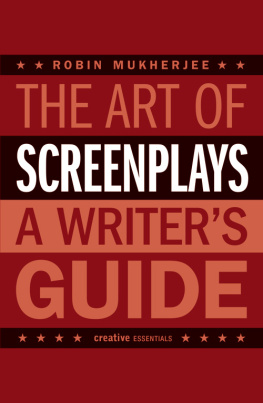
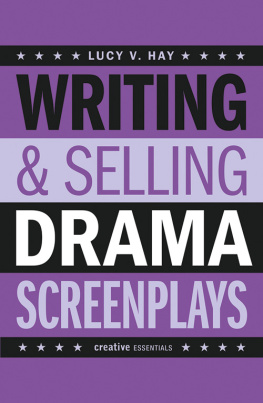
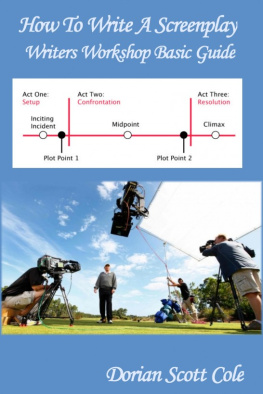
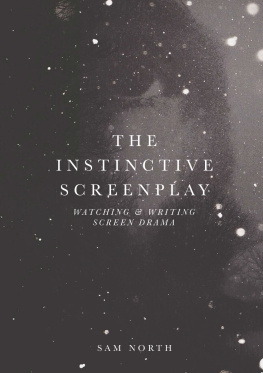

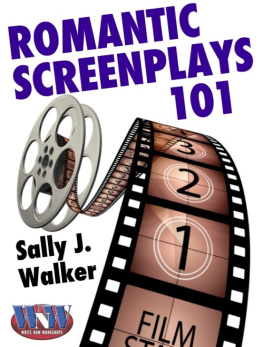
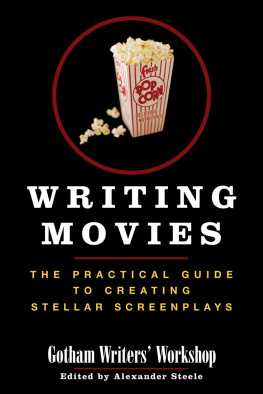
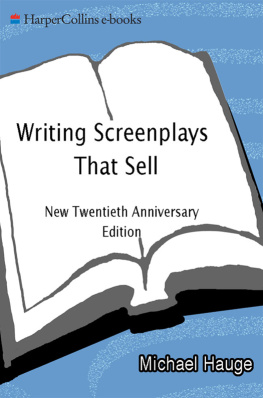
![Watt - The 90-day screenplay : [from concept to polish]](/uploads/posts/book/103527/thumbs/watt-the-90-day-screenplay-from-concept-to.jpg)
